|
Real Life with the Portuguese Water Dog
IS THIS THE BREED FOR ME?
This page is provided as our personal opinion regarding the personalities of the Portuguese Water Dog (PWD). Every dog is an individual; the thoughts herein are generalities that we have experienced over many years living with our own dogs from our specific pedigrees. Canine temperament is in part genetic, varying with different dogs and families of dogs, but temperaments are also largely a product of environment. Temperaments are also formed by the handling and stimulation of a litter by the breeder, and largely by the commitment and ability of the owner to train and socialize their dog. We have lived with several breeds throughout life, and none have affected us like the PWD. We can't imagine life without them. But in all honesty, the PWD is not a breed for everyone. Sometimes people want one so much that they don't think about the personality of a true working dog. The PWD might look like a cute, simple and fluffy creature to some, but they are much more complex. A dog that could do a job well enough to be paid for it, in a tough and challenging environment, is a dog of very special qualities. You have probably read that they are quite intelligent, that is an understatement! They are amazingly smart; that is good and bad. Their intelligence means they are fun and quick to train if you have experience training dogs, it also means they are masters of manipulation, which is a challenge sometimes. They are a good guardian, quite agile, exuberant, willing to learn, loving, and loyal combined with a working drive and a rather unique sense of humor. All dogs need lots of love; that goes without saying, the PWD is particularly demanding of your attention. If you want a dog that is a big presence in your life, this might be the dog for you. TRAINING: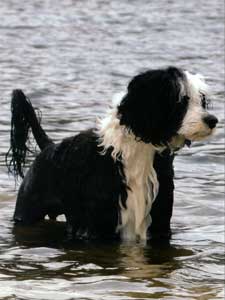
The commitment of time and effort needed for training and caring for the Portuguese Water Dog is a responsibility to consider carefully. According to experts, the number one reason that dogs are dumped is NOT the bad temperament of a dog; it is due to lack of socialization and successful training by owners. Choosing to add a dog to the family carries many of the same commitments as adding a person to the family. We all know that we are responsible for training our children; the same is true for our dogs. Puppies are a blank slate, ready to be the best canine citizen possible with our guidance and training. It is a common misconception that a smart dog will need less effort with training. Perhaps it will help to think about the education that is provided to a gifted child. The extreme intelligence of the PWD means we need to provide positive, consistent training in a fun, challenging environment, not less training. Dogs are more comfortable knowing they do not need to be responsible for watching out after everything in life. They appreciate having a family leader in their lives. Positive training with your canine partner provides an enjoyable bond with your dog, develops the dog's comfort level with you as their teacher/leader, and provides you with a dog that is a joy to be around. 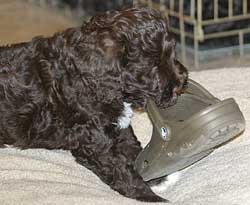
This is not a soft mouthed breed. Their purpose was to assist the fishermen with heavy retrieving. Everything goes into their mouths like a two year old human. Consequently, puppies can be mouthy on our clothing and hands. They are actually learning and testing the strength of touch that is acceptable when they mouth us. It is up to us to tell them what strength is ok. We personally find training the PWD fun and rewarding. We do a lot of game playing during training because it is not monotonous and the dogs enjoy these training methods much more than repetition training. The dogs love being told what they have done that was RIGHT and they will repeat those behaviors. They show amazing brilliance and trust in this positive training environment. As long as you are willing to invest your time training and socializing your puppy in a positive environment, supporting good behaviors twice as much as utilizing reprimands, the amazing qualities of the breed can be brought forth. It is best to be honest. The breed is intuitive and tends to reflect the environment they are in and the people they are with. If you are a Nervous Nelly, your PWD will start looking for ghosts and will mirror your attributes. If you are calm and self assured, your dog will be too. If you tend to be a person without time or patience, if you tend to yell at dogs or even smack them, please pass on this breed. They will not respond to that type of training, you'll get disgusted with the breed and the dogs will give you "the paw" too. A good place to begin researching trainers for you and your dog is www.apdt.com. There is no accreditation required for dog trainers, anyone can hang a sign out and train dogs, so it is always advisable to attend a class (without your dog) and observe training techniques. Seek out a trainer who has good human communication skills, uses positive canine training procedures and doesn't look for a quick fix (like utilizing pinch collars or negative reprimands.) COAT CARE:The PWD is considered a non-shedding dog, although anything with hair loses some hair. Because their hair continually grows like ours, they require professional bathing and trimming approximately every four weeks. The dogs are single coated and do not have dander, but to say the dogs are hypoallergenic is misleading. Humans can be allergic to all kinds of things. People with allergies can sometimes live with the dogs without issue, sometimes not. The dogs require lots of attention to their coats. Companion dogs are sometimes kept in a short cut to minimize the coat care responsibility of owners. Even in a short cut, they require weekly brushing to keep them mat free. We should all remember that mats are painful for dogs, and the removal of mats can be even more painful. It is sometimes difficult to find someone familiar with grooming a PWD. There is a grooming guide provided on the Portuguese Water Dog of America's national club web site at www.pwdca.org. It is helpful to take a copy of the guide, along with pictures of well groomed dogs, to your groomer of choice. EXERCISE AND ENVIRONMENT: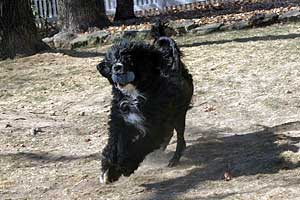
We feel that the dogs do best when they are loved and cared for in a home environment where they are part of our lives and not home alone all day. They should learn to be crate trained, but shouldn't primarily live in a crate, nor should they be tied out or left outside. Due to their intelligence, they get very bored without interaction with their owners. Boredom causes destructive behaviors. They are very connected to everyone in their family and need human companionship more than other breeds we know of. They do require exercise. A walk a day and a couple of good runs in their yard retrieving toys seems to handle the requirements of our young adult dogs. Puppies need a bit more free exercise run time. "Free exercise" means that puppies are allowed to run and play at their own speed in their fenced yard and rest when they choose. Free exercise is healthy for the young puppy because they do naturally rest. With puppies, it is not advisable to succumb to their exuberant desire to "take me with you" if you are going for a jog. Taking them with you on a jog would be what we refer to as "forced exercise" because they cannot stop to rest naturally. For healthy structural development, many experts recommend that we wait for that type of exercise until dogs are adults and their growth plates are closed. Owners who provide real fencing and a yard for their dogs are much happier. Frequent walks combined with a fenced in area to safely play and run off some steam are advantageous for the dogs at any age. Fences are not an automatic safety net; nor should the PWD be relegated to the yard. The dogs should be and want to be accompanied and part of our lives, even in a fence. We spend lots of time in our fenced yard with our dogs while they are exercising, playing and training. They thrive enjoying our interaction with them. It is our opinion that electric fences (E-fences) don't work well. The dogs are smart enough to cross them quickly, and also smart enough not to come back, knowing they will get zapped for coming back to you. E- Fences don't protect your dog from a strange dog or a wild animal. They can make your dog a sitting duck. Probably the worse thing about electric fences is that they teach a smart dog that anytime they are interested in something approaching, like another dog or a person, they will get warned and shocked, thereby possibly turning good social behavior into a danger in the dogs' mind. An E-Fence can teach the dogs to be very territorial and to bark. It isn't difficult to figure out the negative effect all of this can have on the effort you have put into training and socialization. We can't think of a worse or more unfair way to train a dog than to shock it into performing any behavior, including teaching them boundaries, so we have never been supportive of electric fencing. OTHER PETS:The PWD is great with other dogs, but they are best together with another PWD. They have a unique way of playing that can be fully appreciated when you see two or more romping together. At times their exuberance can be misread by a dog of another breed, so it is best if introductions and play time with other dogs is managed, monitored and introduced slowly in a non-threatening, controlled manner. PWDs and CHILDREN: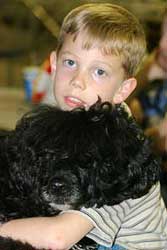
Children should always be supervised by adults when interacting with our canine friends. The dogs are intelligent, but they are DOGS. Our personal dogs adore children, and are very gentle with them, but it is important to remember that we train our dogs and we don't put them into circumstances of concern. These aren't small little dogs; they can be powerful at play. Smaller children might not mix well with their exuberance. It is all about common sense and good parenting. In short, if you train your dog well, socialize it with children properly as well as responsibly oversee the gentleness of children with your dog, you should have success. We suggest that owners either get the puppy a year or two prior to having a child, consider adopting an older well trained dog or wait for a puppy until children are old enough to understand and help with correct training procedures.
HEALTH and VET CARE:PWDs in a breeding program should be excellent representatives of the breed so that we are continually working toward improving the breed. There are several PWDCA recommended pre-breeding tests: OFA, Optigen, CERF, GM1, and JDCM. The purposes of these tests, ages for testing, and recommendation guidelines are explained on the PWDCA web site (www.pwdca.org). There is also a database of dogs and their health records provided by the PWDCA on their web site under "Health". Breeders that you interview should be willing to disclose health test results of the sire and dam for their puppies. Test results for hip health, elbows and CERF exams are available for public research on the OFA web site too at www.offa.org. It is simple to research this site by breed and kennel names. In regard to general health, the PWD is a healthy, courageous and very stoic breed. It is not easy to tell if they are sick. If they are off of their food or depressed, time to look for an underlying cause. While the breed enjoys a healthy population now, we still have a small gene pool. Autoimmune issues are still a challenge within the breed. Many Vets are unfamiliar with our breed and their unique issues. Research Vets in your area that are willing to work WITH you regarding this breed's unique needs. It is best not to pick a Vet because your neighbor likes his bedside manner for his Labrador, look a little deeper for someone that is up to date on current inoculation protocols, is an excellent internist and diagnostician, has the most up to date equipment and is interested in caring for your dog as an individual rather than like every dog that walks into a clinic. One of the best ways to find a good Vet is to seek out those that breeders and competition enthusiasts employ. A quick search of regional kennel clubs on the AKC web site www.akc.org will put you in touch with active kennel club officers that should be able to provide references for local Vets or groomers. THE HUMOROUS SIDE OF THE BREED: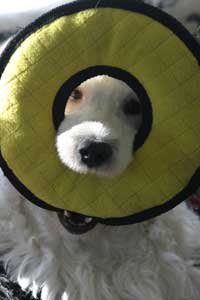
The dogs can be really funny, and are known for being characters. They aren't yappy, but they are very verbal, and talk or woo woo with toys in their mouths a lot. If you are telling them "no" they are likely to woo woo and wiggle at you trying to manipulate you into thinking it wasn't really that bad. If you have left the room, they will greet you upon your return like you have been gone for a week. If that is not enjoyable to you, you might consider a sweet, but less intelligent, breed that won't realize you left. Here are a few additional interesting and fun traits you might experience with a PWD:
In closing, the dogs are amazingly sensitive to their families, very intuitive to your needs, and a truly special, loving companion. If you have the time to devote to these amazing dogs, we doubt if you will ever share your life with a better dog. |